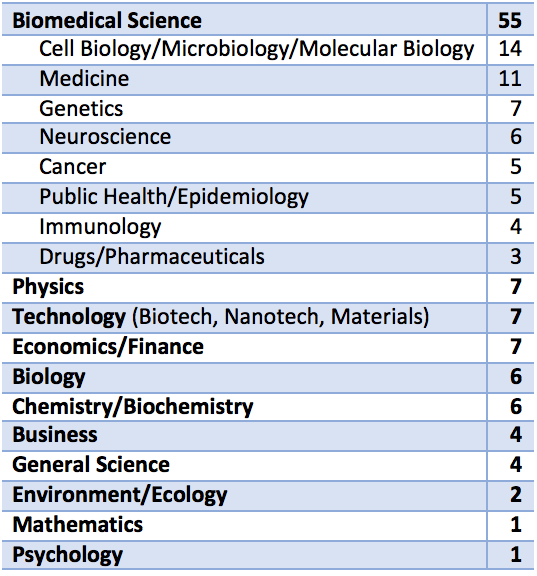Last week, a funny and clever hoax was perpetrated against a social sciences journal. The hoaxers wrote an absurd paper on how the penis is merely a social construct. And for good measure, they claimed it made climate change worse. Somehow, the paper passed peer review, and the predictable result was widespread mockery of the social sciences -- and gender studies, in particular -- across the Internet.
Not everybody was amused. A couple of critics raised legitimate objections. One of them noted that Cogent Social Sciences, the victim of the hoax, is a vanity or predatory journal with no credibility. Another claimed that a respectable outlet, like the American Journal of Sociology, would never have been fooled.
But that raises an important question. In a field like gender studies, what constitutes a respectable outlet? We can make progress toward answering that question by utilizing SCImago's ranking of academic journals.
 The Top 100 Science Journals
The Top 100 Science Journals
Every ranking of academic journals is controversial. The most well-known method, known as Impact Factor, has been rejected by reputable journals. Still, whether academics like it or not, some sort of ranking system will always exist. And the SCImago ranking, called SJR, is as good as any1.
According to SJR, the most prestigious journals are dominated by the biomedical sciences, which take 55 of the top 100 spots. Physics, chemistry, biology, and other general sciences, including math and technology, claim another 33 spots. Altogether, the hard sciences and their direct applications constitute 88 of the top 100 journals.
The remaining 12 spots are shared by soft sciences, like economics and psychology, and non-scientific fields, such as business.
There Are Few Prestigious Social Science Journals
There is a curious lack of social science or humanities journals in the top 100. For instance, there is only one journal dedicated to psychology2. If business and economics are counted, then a total of 12 of the top 100 journals cover the social sciences. (Put another way, there are more top 100 journals covering the biomedical subdisciplines of cell biology/microbiology/molecular biology than all the social sciences combined.) SJR considers Administrative Science Quarterly (which we classified as a business journal) to be a sociology journal, so it represents the one sociology journal in the top 100.
How many gender studies journals are in the top 100? Zero. In fact, there is only one gender studies journal in the top 1,000. Titled Gender and Society, it ranks at #933.
The takeaway from this analysis is clear: The hard sciences constitute the hottest fields and most prestigious journals. By comparison, social science journals are not nearly as prestigious. By definition, that means social science journals, as a whole, are not cited by prestigious journals.
There are many reasons for that. But one of them certainly is that the quality of the research just isn't very good. That's why penis hoax articles can get published.
Notes
(1) For the rationale behind its methodology, see here and here.
(2) Many of the top 100 journals are interdisciplinary, so arriving at a single classification for a journal is not always straightforward. For instance, despite its title, Energy and Environmental Sciences is probably best described as a technology journal. Trends in Cognitive Sciences is a neuroscience journal, but contains psychology and political science, as well.




